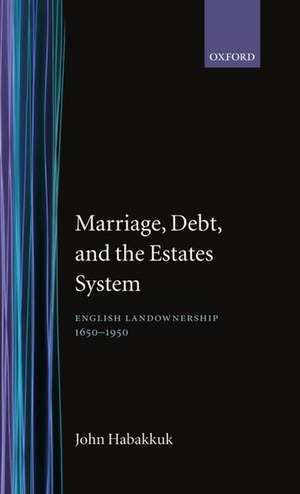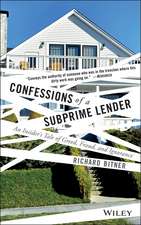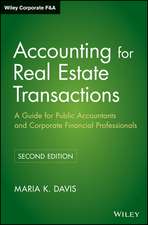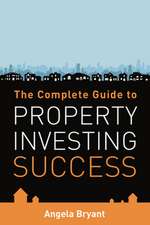Marriage, Debt, and the Estates System: English Landownership, 1650-1950
Autor John Habakkuken Limba Engleză Hardback – 7 sep 1994
Preț: 1970.05 lei
Preț vechi: 2993.76 lei
-34% Nou
Puncte Express: 2955
Preț estimativ în valută:
377.01€ • 393.11$ • 313.33£
377.01€ • 393.11$ • 313.33£
Carte tipărită la comandă
Livrare economică 10-17 martie
Preluare comenzi: 021 569.72.76
Specificații
ISBN-13: 9780198203988
ISBN-10: 0198203985
Pagini: 804
Dimensiuni: 163 x 243 x 51 mm
Greutate: 1.22 kg
Editura: Clarendon Press
Colecția Clarendon Press
Locul publicării:Oxford, United Kingdom
ISBN-10: 0198203985
Pagini: 804
Dimensiuni: 163 x 243 x 51 mm
Greutate: 1.22 kg
Editura: Clarendon Press
Colecția Clarendon Press
Locul publicării:Oxford, United Kingdom
Recenzii
There are few books of which it can genuinely be said that they represent a real advance in our under-standing of how the past worked. This is one of them, and the electors to the Ford lectures at Oxford are to be congratulated on their shrewdness in inviting Sir John to give them in 1985. They have been handsomely repaid.
this is a very long and detailed book with a wealth of illustration....There are few books of which it can genuiinely be said that they represent a real advance in our understanding of how the past worked. This is one of them, and the electors to the Ford lectures at Oxford are to be congratulated on their shrewdness in inviting Sir John to give them in 1985. They have been handsomely repaid.
In its detailed coverage of the field it has no equal...this volume contains as much detail as most people are ever likely to want to know about the finances of landed estates over 300 years. It is an invaluable reference work, examining as it does a wide range of mechanism of property transfer and citing an enormous number of specific examples. The prose is smooth, the presentation is impeccable.
The present work provides at once an enormous quarry of factual information about landowners, their finances and their estates, in the form of the many examples cited, and a similarly vast fund of ideas generated by a lifetime of thinking about the problems of English (and Welsh) landownership. On both counts its publication ensures that for a long time to come Habakkuk will continue to provide the point of entry for landownership studies in the post-Restoration period...Habakkuk writes, as one would expect, with limpid clarity, and with a style that carries the reader easily along despite the density of the material deployed...Habakkuk's knowledge of landed families is unrivalled
clearly a definitive attempt at resolving the divers problems associated with insolvency and illiquidity. For historians of business this elaborate and complex disquisition is perhaps the main reason for reading the book...Sir John's greatest gift as a historian who traffics in ideas is his ability to hold a firm narrative line. Despite all the illustrative material he offers the reader, he tells a clearly presented story. This is an attribute long disparaged in the writing of academic monographs, but it remains essential for good historiography. the book is important for several reasons...This is the masterly summation, interleaved with additional evidence, of 60 years of research of the chief begetter of the history of aristocracy after the bouleversements of Tawney's Century.
He deploys an impressive erudition, ranging from a minute knowledge of the development of credit instruments to an equally minute knowledge of aristocratic geneology. He has raised important questions about the economy of the landed estate and about the organization of the aristocratic family.
The two volumes demonstrate the enormous influence that Habakkuk has exerted over scholars of his time ... the Festschrift ... demonstrates that he is not only the historian of landownership, but has also broken new ground in other fields ... This Festschrift is handsomely produced ...Habakkuk's book shows the importance of settlement in more than agricultural terms ... It is a book containing a mass of information and detail, setting out in the clearest language the 'estate system' with all its ramifications, and illustrating the great varieties in practice by a myriad of examples. It is difficult to see how the book could have been done better: it will provide a quarry for decades to come, and should be required reading for agricultural and indeed all English historians.
splendid book ... The details are massed down the age, yet the writing is so clear, and the material so well organized into sections, that the reader is led effortlessly through the examples to the conclusions at the end of each chapter. Habakkuk's great book is the culmination of his work on landownership. His legacy will be that his ideas will continue to provoke historical debate of the highest quality, enhanced by the richness of the material available in the United Kingdom.
this is a very long and detailed book with a wealth of illustration....There are few books of which it can genuiinely be said that they represent a real advance in our understanding of how the past worked. This is one of them, and the electors to the Ford lectures at Oxford are to be congratulated on their shrewdness in inviting Sir John to give them in 1985. They have been handsomely repaid.
In its detailed coverage of the field it has no equal...this volume contains as much detail as most people are ever likely to want to know about the finances of landed estates over 300 years. It is an invaluable reference work, examining as it does a wide range of mechanism of property transfer and citing an enormous number of specific examples. The prose is smooth, the presentation is impeccable.
The present work provides at once an enormous quarry of factual information about landowners, their finances and their estates, in the form of the many examples cited, and a similarly vast fund of ideas generated by a lifetime of thinking about the problems of English (and Welsh) landownership. On both counts its publication ensures that for a long time to come Habakkuk will continue to provide the point of entry for landownership studies in the post-Restoration period...Habakkuk writes, as one would expect, with limpid clarity, and with a style that carries the reader easily along despite the density of the material deployed...Habakkuk's knowledge of landed families is unrivalled
clearly a definitive attempt at resolving the divers problems associated with insolvency and illiquidity. For historians of business this elaborate and complex disquisition is perhaps the main reason for reading the book...Sir John's greatest gift as a historian who traffics in ideas is his ability to hold a firm narrative line. Despite all the illustrative material he offers the reader, he tells a clearly presented story. This is an attribute long disparaged in the writing of academic monographs, but it remains essential for good historiography. the book is important for several reasons...This is the masterly summation, interleaved with additional evidence, of 60 years of research of the chief begetter of the history of aristocracy after the bouleversements of Tawney's Century.
He deploys an impressive erudition, ranging from a minute knowledge of the development of credit instruments to an equally minute knowledge of aristocratic geneology. He has raised important questions about the economy of the landed estate and about the organization of the aristocratic family.
The two volumes demonstrate the enormous influence that Habakkuk has exerted over scholars of his time ... the Festschrift ... demonstrates that he is not only the historian of landownership, but has also broken new ground in other fields ... This Festschrift is handsomely produced ...Habakkuk's book shows the importance of settlement in more than agricultural terms ... It is a book containing a mass of information and detail, setting out in the clearest language the 'estate system' with all its ramifications, and illustrating the great varieties in practice by a myriad of examples. It is difficult to see how the book could have been done better: it will provide a quarry for decades to come, and should be required reading for agricultural and indeed all English historians.
splendid book ... The details are massed down the age, yet the writing is so clear, and the material so well organized into sections, that the reader is led effortlessly through the examples to the conclusions at the end of each chapter. Habakkuk's great book is the culmination of his work on landownership. His legacy will be that his ideas will continue to provoke historical debate of the highest quality, enhanced by the richness of the material available in the United Kingdom.









